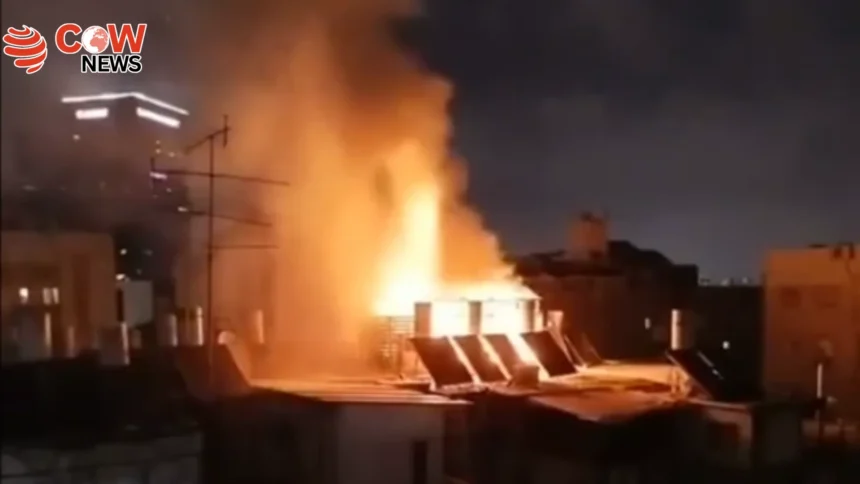Tehran ( The COW News Digital ) Iran’s Islamic Revolutionary Guard Corps (IRGC) has carried out a fresh round of missile and drone attacks on Israeli targets, marking the 18th such assault on Israeli soil since the conflict began. The attack, which targeted military facilities, operational support centers, and Israel’s Ben Gurion International Airport in central Israel, has exacerbated tensions in the region.
According to the IRGC, locally manufactured Shahed-136 drones played a central role in the operation, continuously attacking occupied airspace. In addition, Iranian missiles powered by both solid and liquid fuels were deployed, despite Israel’s advanced defense systems failing to intercept the strikes. The IRGC confirmed that both the drone and missile strikes were carried out with precision and aimed at strategic Israeli targets.
Late-night reports from the Israeli authorities confirmed that Iranian missiles landed in central Israel’s Dan Gush region, causing a fire in a residential building after missile fragments hit the structure. While there have been no confirmed casualties so far, the extent of the damage and any potential injuries remain unclear.
In retaliation, Israel’s air force launched missile strikes on central Iran, targeting missile storage facilities and launching infrastructure. The ongoing back-and-forth exchange of missile strikes underscores the deepening military confrontation between the two nations.
The recent escalation comes at a time when international diplomatic efforts to broker a ceasefire are intensifying. The United Nations Security Council convened an emergency session, calling for an immediate cessation of hostilities, while European foreign ministers urged their Iranian counterparts to engage in peace talks. However, despite these global calls, Israel’s military actions have continued unabated.
In response to Israel’s ongoing aggression, Iran retaliated by launching a barrage of ballistic missiles on the southern Israeli city of Beersheba, inflicting severe financial damage and causing widespread fires in the area. Israeli media reports indicate that the missiles targeted a residential area, causing extensive damage to nearby buildings and vehicles, although no casualties have been reported. The Israeli defense systems again failed to intercept the incoming missiles, pointing to a potential vulnerability in the country’s defense infrastructure.
The missile barrage came just one day after Iran targeted Beersheba’s Soroka Hospital, injuring over 70 people. The Israeli Air Force issued a statement acknowledging that a malfunction in their interceptor defense systems had contributed to the failure in preventing the Iranian missile strikes.
In a separate development, the White House announced that President Donald Trump will make a decision regarding direct U.S. involvement in the Israel-Iran conflict within the next two weeks. White House spokesperson Caroline Levitt said that President Trump’s decision will be based on the facts surrounding the situation and the potential for diplomatic negotiations with Iran.
While Trump has expressed a preference for diplomatic resolutions, his top priority remains preventing Iran from developing nuclear weapons. Levitt added that while Trump is committed to peace, he would not shy away from using force if necessary to protect U.S. interests and prevent Iran from acquiring nuclear capabilities.
The ongoing violence between Israel and Iran has had significant geopolitical repercussions, with many nations calling for immediate de-escalation. As both sides continue to exchange military strikes, the international community remains deeply concerned about the potential for the conflict to spiral into a full-scale war that could destabilize the Middle East and beyond.







